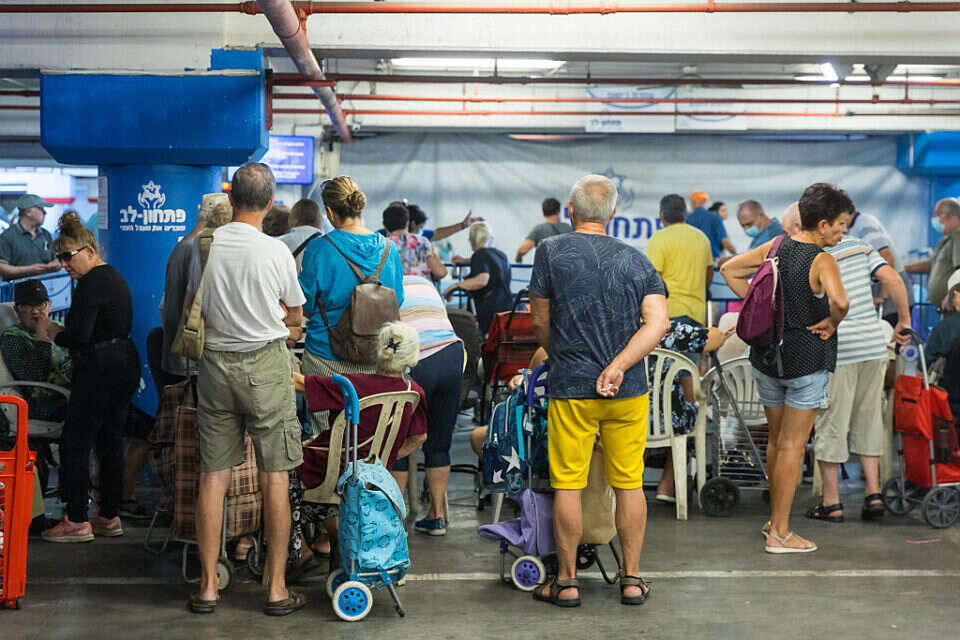The minimum monthly cost needed to buy a monthly basket of basic food at one of the cheapest marketing chains, which will ensure nutritional security according to the criteria established by the Ministry of Health, is NIS 3,431 per month for a family of five.
This figure emerges from a test conducted by an organization to give out before Rosh Hashanah due to the increase in prices in the economy, the results of which were obtained by Israel Hayom. Last year the basket was NIS 3,186, so this is an increase of 7.7%. This means that families who are forced to spend less on food of the minimum required live in food insecurity, and are below the "hunger line", defined by the cost of the basic food basket to ensure adequate nutrition.
Making food baskets for the needy in Rehovot, April 2022. More families below the "hunger line",
Meir Panis branch in Or Akiva, this month.
donate more,
"I didn't think we would get to this point"
According to the organization's data, the actual average expenditure on household food consumption of the lower quintile and aid recipients is NIS 2,155, so the gap between the required expenditure on food and the actual expenditure is on average NIS 1,276.
The expenditure on the basic basket constitutes about a third (33.7%) of the net income for a family of five, where both parents work full time and earn minimum wage.
This means that a family that lives in poverty or close to the poverty line, and cannot afford to purchase a minimal food basket - certainly cannot afford to purchase a basket that includes healthy products, such as whole grain products and whole flour, which are sold at higher prices and are not regulated.
G. (57), a mother of six children from Beit Shemesh, whose income and her husband's income amount to NIS 8,000, says that if it weren't for the help she receives from the associations, she would not be able to afford to buy products for the holiday.
On a daily basis, she says, she only buys what she needs, settles for little and gives up many things.
supermarket.
"We come in and don't know what to buy", photo: Oren Ben Hakon
Igor Vilna, residents of Kiryat, live on about NIS 8,500 a month.
Igor has been waiting for a heart transplant for three years, and cannot work.
Yelena, who drives him several times a month to check-ups at the hospital, can only work part-time.
Along with paying rent, medicine and other bills, they are unable to live with dignity.
"It's very difficult for us. Prices have gone up lately, we go into the supermarket and don't know what to buy."
When they were offered about two months ago by the organization to receive aid in the form of food baskets, they were embarrassed at first.
"I never thought we would get to this situation. All our lives we worked and the money was always enough, but now we can't live," says Yelena.
Eran Weintraub, CEO of the Leta organization: "We hope that the elected government will place poverty, food insecurity and social disparities high on the national priority list, and will allocate appropriate resources to support the most vulnerable populations in Israeli society."
Eran Weintraub CEO of Leta, photo: Oren Nachshon
Contribute more
At the same time, data collected on the JGIVE online donation platform indicate an increase in all donation indices this year, compared to the corresponding period last year, according to the Hebrew calendar.
In the last month, about 8,500 donations totaling about NIS 6.4 million were made to more than 600 associations.
The total value of donations in the corresponding period last year was NIS 2.8 million, and the number of donations was about 7,500.
The average donation last year was NIS 100, while this year it is NIS 120.
The leading field is society and community - 31.5% donated to non-profit organizations in this field.
12.5% donated to welfare associations, 6.2% donated to associations helping Holocaust survivors, 10.5% donated to designated projects for the holiday, while 9.4% donated to associations in the field of Judaism.
The CEO of JGIVE, Uri Ben Shlomo, said: "Every year we marvel at the open heart of the Israeli people, the help and the mutual guarantee during the Tishrei holidays, but this year, against the background of price increases and the cost of living, the Israeli heart is revealed in all its glory."
were we wrong
We will fix it!
If you found an error in the article, we would appreciate it if you shared it with us

